Neurorehabilitation: Best hospitals and rehabilitation programs in Germany
Here you will find most technologically advanced neurorehabilitation hospitals in Germany
Focus of treatment:
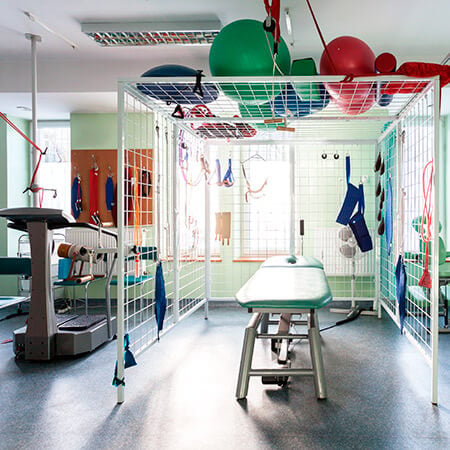
Department of Neurological Rehabilitation
The Department of Neurological Rehabilitation, which is well known for its experience in the neurological rehabilitation area since 1979, offers the patients a full range of medical services. Patients are receiving a treatment here according to the highest standards with the participation of neuropathologists and internists.
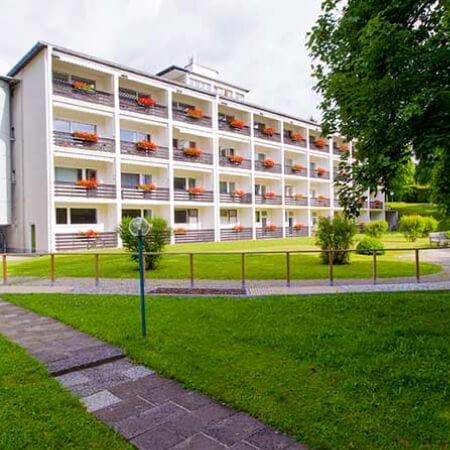
Department of Neurology and Neurological Rehabilitation
The Department of Neurology and Neurological Rehabilitation offers high quality emergency care and the full range of rehabilitation measures for patients with diseases of the nervous system. Particular attention is paid to early rehabilitation, which begins during the acute period of the disease, when the patient is in the inten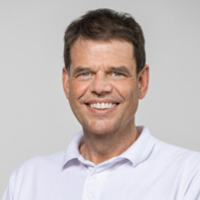
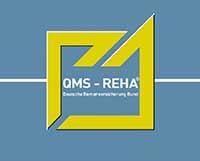
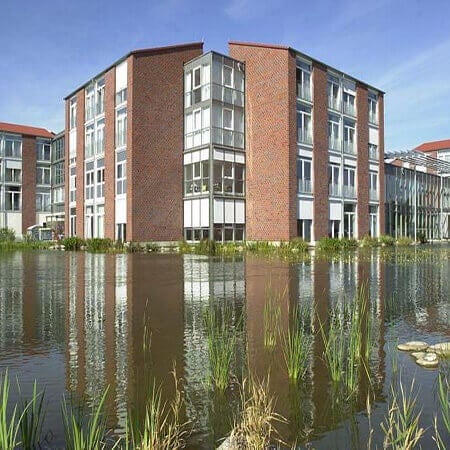
Department of Neurology
The Department of Neurology offers the comprehensive rehabilitation treatment for patients with diseases of the central and peripheral nervous system. The department's specialists mostly deal with the treatment of patients with lesions of the brain and spinal cord due to strokes, traumatic brain injuries, inflammatory and de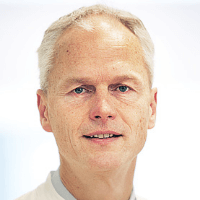


Neurological rehabilitation is a set of medical measures aimed at improving the quality of life of patients with disorders of the nervous system. The patients after a stroke and children with cerebral palsy often need neurological rehabilitation. Doctors develop customized rehabilitation programs for them. The rehabilitation clinics in Germany provide professional medical care to the patients with different neurological disorders.
Content
- The treatment of which diseases is followed by neurological rehabilitation in Germany?
- Is diagnostics required before starting a rehabilitation program?
- The focus of neurological rehabilitation after stroke
- Dysphagia treatment
- Neurological rehabilitation for patients with Parkinson disease
- Neurorehabilitation for muscular dystrophies
- Rehabilitation methods for spinal cord injuries
- Neurorehabilitation after the treatment of brain tumors
- Best clinics for neurorehabilitation in Germany
- Cost of neurological rehabilitation in Germany
- How to start neurological rehabilitation in Germany?
The treatment of which diseases is followed by neurological rehabilitation in Germany?
Neurological rehabilitation in Germany is recommended for patients with:
- Peripheral neuropathy.
- Traumatic brain injuries of varying severity.
- Epilepsy, mental disorders, and neurological disorders.
- Migraines, excruciating headaches, and sleep disorders.
- Abnormal psychomotor development.
- Mental retardation.
- Multiple sclerosis.
- Parkinson disease.
- Musculoskeletal disorders.
- Stroke.
- Language and speech disorders.
- Dysphagia and eating disorders.
- Spinal cord injuries.
- Brain tumors.
- Cognitive disorders caused by syndromes of neurological genesis, emotional instability.
Neurorehabilitation is the complex of medical interventions aimed at restoring motor and cognitive functions after the main treatment of neurological pathology.
Cost of outpatient neurological rehabilitation is from €343 per day. You can find other prices on the Booking Health website.
The best hospitals in Germany are:
- University Hospital Rechts der Isar Munich
- Helios Hospital Krefeld
- University Hospital of Ludwig Maximilian University of Munich
- University Hospital Frankfurt-am-Main
- Clinic of Advanced Biological Medicine Frankfurt-am-Main
Is diagnostics required before starting a rehabilitation program?
The complex of diagnostic tests required before neurological rehabilitation includes the following medical examinations:
- Electroencephalogram (EEG).
- Assessment of the condition of the neuromuscular system.
- Electrocardiography (ECG) and radiography.
- Endoscopic evaluation of swallowing.
- Speech and hearing testing.
- CT and MRI.
- The full range of laboratory tests.
Also, the centers for neurological rehabilitation in Germany employ highly qualified clinical neuropsychologists, who will objectively evaluate the abilities of the patient and work out individual teaching methods. If the child needs neurological rehabilitation, parents will be actively involved in the rehabilitation process, helping to create a customized rehabilitation plan. Their participation is important in developing a strategy for a post-inpatient rehabilitation period.
The focus of neurological rehabilitation after stroke
Neurological rehabilitation after stroke depends on the individual characteristics of the patient's state of health, comorbidities, and current health condition. Therapists distinguish several main directions of neurological rehabilitation for patients with an acute impairment of cerebral circulation.
Restoration of motor skills and functions is one of the most important objectives, since it largely determines whether the patient will regain their self-care ability and return to their habitual way of life. Patients are recommended to exercise using various methods, such as physiotherapy and massage.
Restoration of full-fledged speech after stroke determines whether the patient will be able to communicate normally with people surrounding them. The patients with post-stroke speech disorders are usually indicated to have individual and group training with a speech therapist, training using a special device, allowing for the development of the laryngeal muscles.
Neurologists, occupational therapists, and neuropsychologists work with the patients to restore memory. The patients need to do exercises for the development of thinking, memory and attention training. If necessary, medications that stimulate nervous activity may be prescribed.
Dysphagia treatment
Dysphagia is diagnosed when the centers responsible for the swallowing process are impaired. As a result, 60% of post-stroke patients exhibit spasticity of the facial muscles, tongue, larynx, or esophagus. This raises the question not only of adequate nutrition, but also of preventing such complications as aspiration pneumonia, which occurs when either fluid or food particles get into the airways. As a result, instead of active recovery after a stroke, a person has another set of problems: due to malnutrition and dehydration of the body, the rehabilitation potential is reduced, which causes a risk of airway obstruction, aspiration, etc.
The specialists (often speech therapists) usually conduct training to strengthen the muscles of the tongue, larynx, etc., and monitor the results. They also determine the method of treatment based on the results of diagnostic tests and clinical examinations.
The activities that strengthen the muscles of the speech apparatus may include both the practice of simple actions: opening and closing the mouth, folding the lips or tongue, imitating coughing and gargling, saying various sounds with strain, and more complex ones that are chosen by a speech therapist for the specific problems the patient has.
Neurological rehabilitation for patients with Parkinson disease
The severity and impact of Parkinson disease on daily life can vary greatly from patient to patient – from almost imperceptible tremor and slight stiffness at the onset of movement to complete immobility and dementia. Therefore, rehabilitation treatment in each case should take into account the individual characteristics of the patient.
Prior to assigning the specific neurological rehabilitation program, a neurologist carefully studies medical records, conducts a detailed clinical examination, tests such functions as muscle strength, tone, coordination, sensitivity, mental health, memory, speech, etc. As a result, the doctor develops an optimal neurological rehabilitation program, the main goal of which is to preserve motor, speech, and mental activity, as well as the ability to continue the patient's professional activity if possible. Therefore, the set of rehabilitation activities and their intensity will differ for patients. At the end of the course of treatment, the patient will receive individually developed recommendations.
Translingual neurostimulation is one of the fairly novel methods of neurological rehabilitation that affects the brain through stimulation of the language receptors. It is an innovative technique most effectively used in the neurological rehabilitation for patients with Parkinson disease. Translingual neurostimulation increases stress tolerance, both on the physical and mental levels, and has a positive effect on such cognitive functions as concentration and memory, improves sleep, allowing the body to recover and fully rest. The effect achieved after such a method of neurological rehabilitation persists for quite a long time after treatment is discontinued.
Neurorehabilitation for muscular dystrophies
Progressive muscular dystrophies are a group of hereditary diseases with the onset in childhood in most cases. The diseases are characterized by muscle weakness, muscle atrophy, and a progressive course due to progressive degeneration of muscle tissues.
Rehabilitation treatment for muscular dystrophies includes exercising, passive and active stretching aimed at improving the quality of life of patients suffering from the disease and reducing complications, including the prevention of muscular, skeletal, and cardiac disorders due to the loss of muscle strength.
Rehabilitation methods for spinal cord injuries
Nowadays, neurological rehabilitation for spinal cord injuries is carried out using well-tested techniques.
Physical rehabilitation of the patients with spinal cord injuries includes various options of therapeutic exercises that help restore motor function, strengthen the muscles around the spine and eliminate the risk of repeated damage to the spine.
All exercises are performed with special care and only under medical supervision. Doctors usually start with the simplest set of exercises; over time, the intensity gradually increases. During this process, the patient is regularly examined to assess the effectiveness of the selected set of methods and, if necessary, to adjust it. So, if there is significant discomfort and pain, the exercises are stopped until the causes of discomfort are determined and eliminated.
Massage is another great way to restore the muscle condition, get the blood flowing to the affected area, and enable it to heal faster, maximizing the lymph flow, and ensure proper distribution of tension on the joints. The massage is performed by a professional specialist with proper training. During the sessions, a massage therapist uses only small, slow, and cautious movements. Particular attention is paid to the injured area.
Psychological rehabilitation for patients with spinal cord injuries is also conducted. It is possible to undergo this type of therapy both in groups and individually. Such rehabilitation is especially required for patients with temporary or permanently restricted mobility. Experienced psychologists help patients to socialize, work through the insecurities and eliminate the consequences of constant stress.
Neurorehabilitation after the treatment of brain tumors
Depending on the type and size of the brain tumor removed, its localization, and the extent of surgery performed, neurological rehabilitation activities may vary.
During the first stages of postoperative neurological rehabilitation, doctors focus on the successful healing of tissues in the operated area and the control of pain syndrome. Over several days, fluid is excreted from the wound and drained out with the help of drainage tubes. Once the fluid is no longer excreted, the drainage is removed. For pain relief, the patient is prescribed analgesic medications.
The subsequent stages of neurological rehabilitation also involve physiotherapy. The physiotherapist teaches the patient exercises aimed at restoring freedom of movement and coordination. The complex of exercises is chosen individually for each patient. First, the patient performs them together with the physiotherapist and then independently.
Best clinics for neurorehabilitation in Germany
Specialized medical centers for neurological rehabilitation in Germany focus on improving the quality of life, maintaining optimal physiological status, and effective multistage restoration of lost or impaired bodily functions. The successful neurological rehabilitation is guaranteed both for adult patients and children with neurological disorders of any severity (congenital and acquired).
German clinics have all the necessary equipment for effective rehabilitation and careful monitoring of the health condition of patients. There are also specialized wards for paralyzed patients with serious injuries or neurological disorders.
Clinics in Germany admit patients with neurological diseases regardless of the clinical picture and current health status, usually immediately after recovery from the acute phase of the disorder under hospital conditions. The complex of rehabilitation measures includes initial rehabilitation prior to the involvement of the patient in training or work activities.
If you are planning to undergo neurological rehabilitation in Germany, please consider the following clinics:
- Neurological Rehabilitation Clinic Godeschoehe Bonn.
- Neurological Rehabilitation Clinic Schmieder Clinics Heidelberg.
- St. Mauritius Therapieklinik Meerbusch.
- Maternus Rehabilitation Clinic Bad Oeynhausen.
- Rehabilitation Clinic Benedictus Krankenhaus Feldafing.
- Neurological Rehabilitation Clinic RehaNova Cologne.
- MEDIAN Rehabilitation Clinic Flechtingen.
Please visit the Booking Health website for detailed information about the clinics.
Cost of neurological rehabilitation in Germany
The cost of a neurological rehabilitation course depends on many factors, so its price may vary greatly. While patients with some diseases may need only a few days to fully recover, patients who have undergone surgery to remove a brain tumor may require several weeks or even months, during which psychologists, speech therapists, physical therapists, occupational therapists, and specialists from other medical fields actively work with the patient. By the way, the larger the number of specialists involved in the program for neurological rehabilitation is, the higher its cost will be.
On average, the price of early rehabilitation in Germany starts at 1,180 EUR; the price of Phase B rehabilitation starts at 758 EUR; the price of Phase C rehabilitation starts at 678 EUR; the price of rehabilitation for spinal cord injuries starts at 1,133 EUR; the price of pediatric neurological rehabilitation starts at 772 EUR per day.
Please contact Booking Health for a free consultation on the cost of neurological rehabilitation in Germany.
How to start neurological rehabilitation in Germany?
The most convenient way is to use the services of the medical tourism company Booking Health.
Booking Health will quickly and efficiently organize neurorehabilitation in Germany for you or your child, taking into account your diagnosis and conducted treatment, budget, and service preferences.
All you need to do is to fill out the request form on the Booking Health website so that our medical advisor could contact you.
Authors:
The article was edited by medical experts, board certified doctors Dr. Vadim Zhiliuk and Dr. Sergey Pashchenko. For the treatment of the conditions referred to in the article, you must consult a doctor; the information in the article is not intended for self-medication!
Our editorial policy, which details our commitment to accuracy and transparency, is available here. Click this link to review our policies.
Sources:

